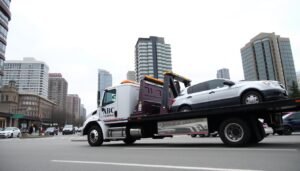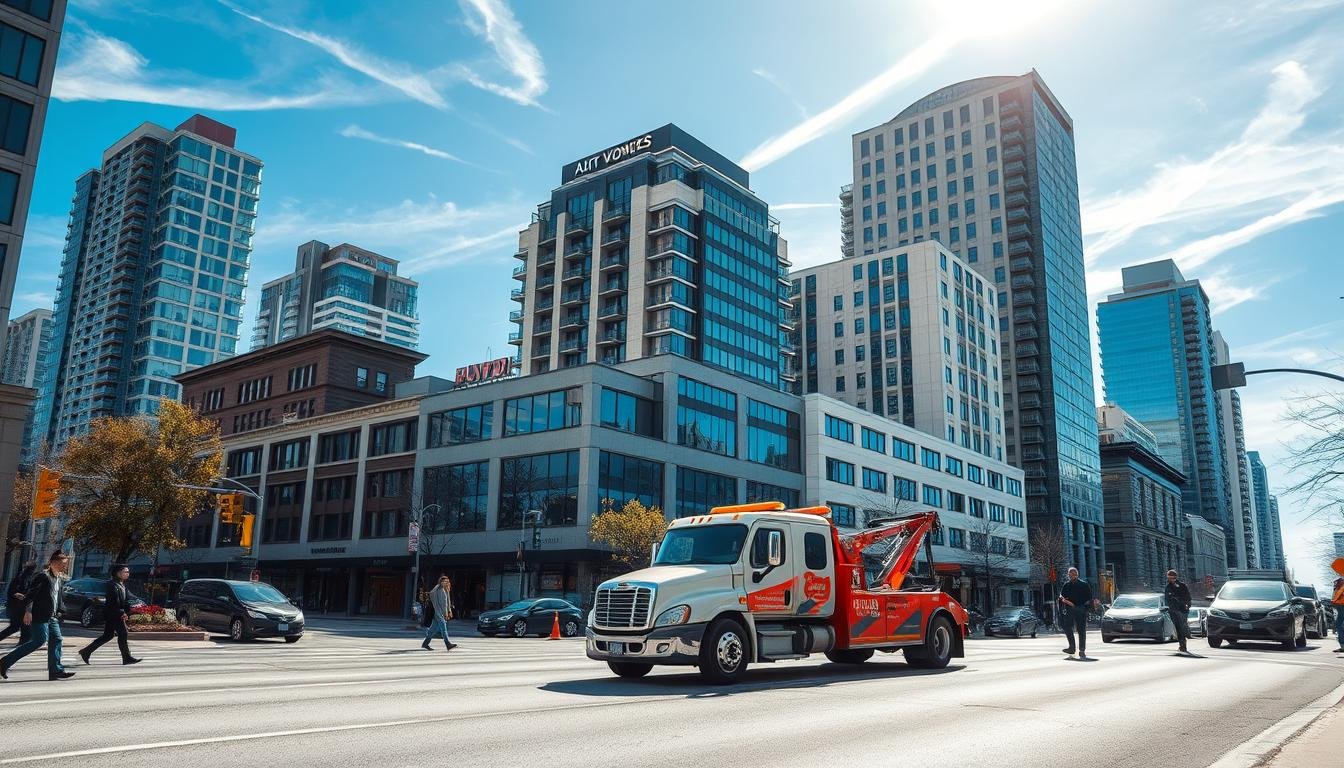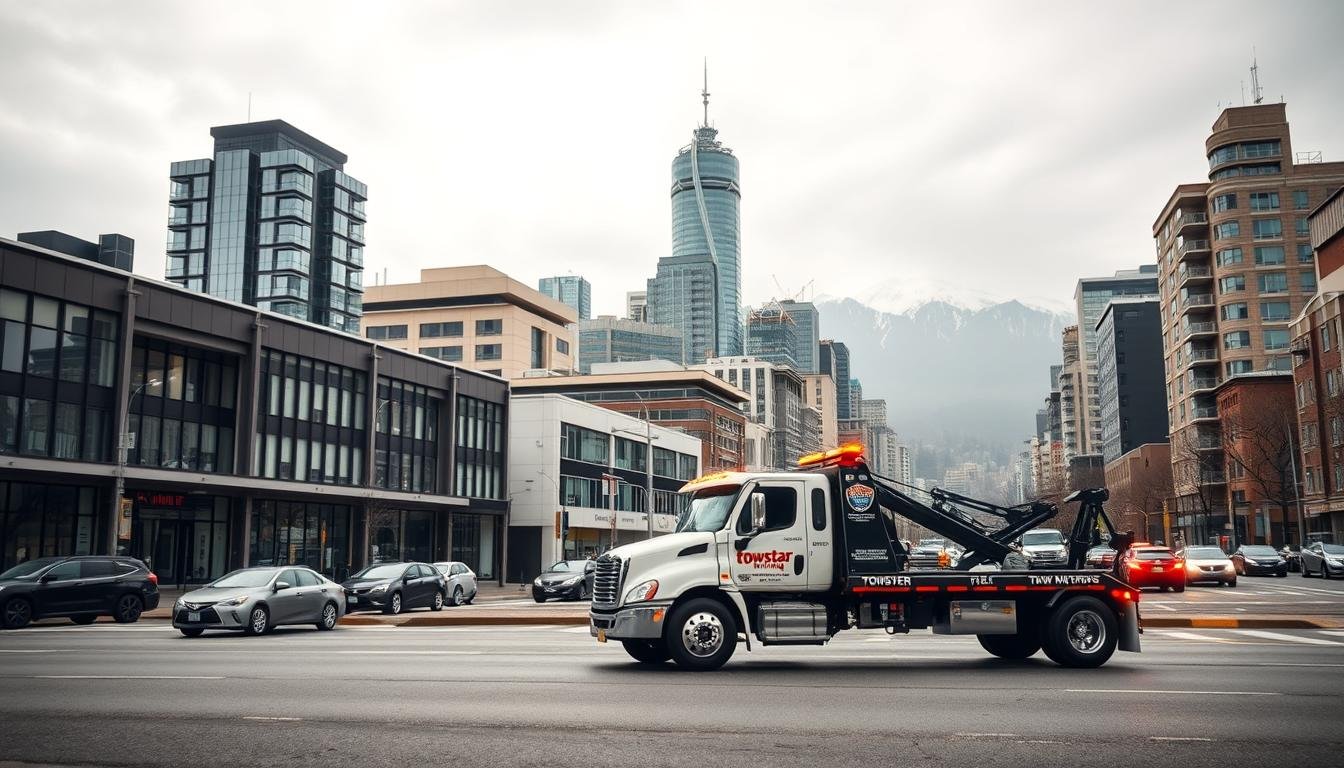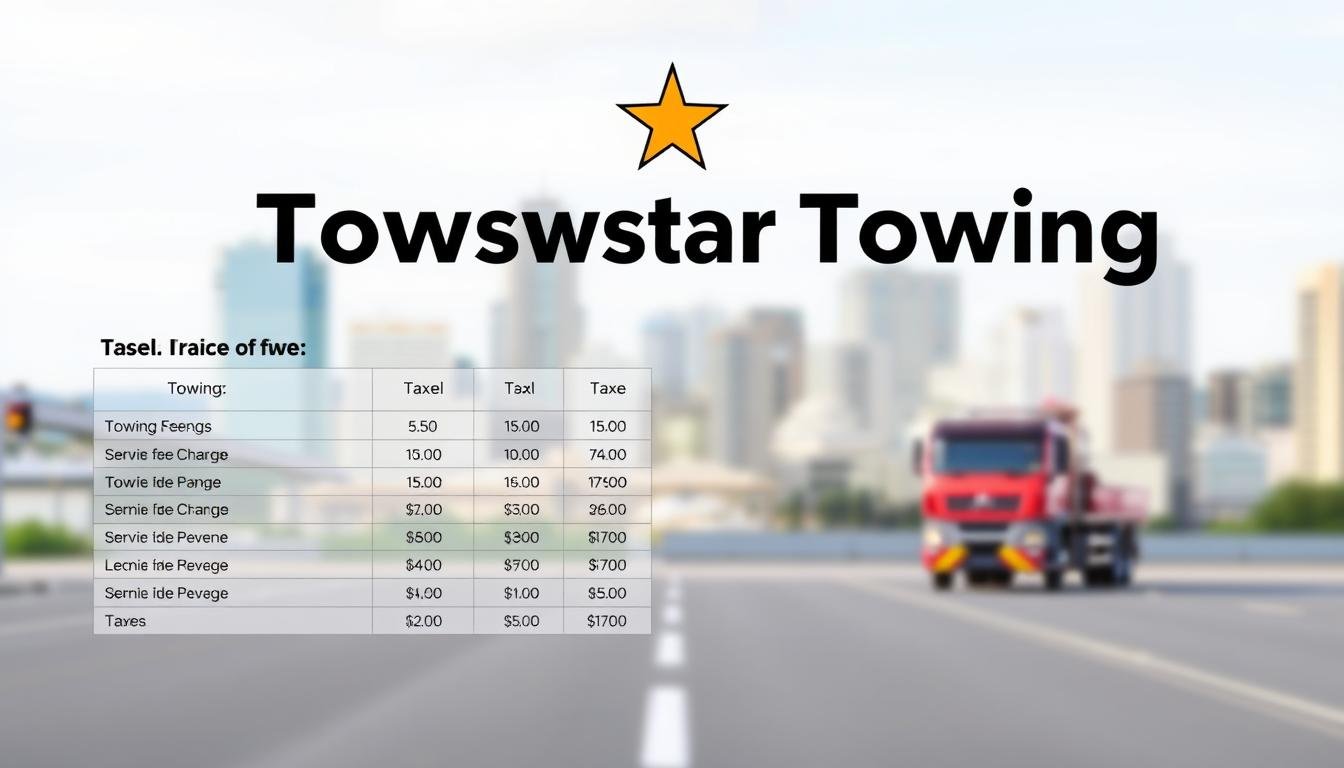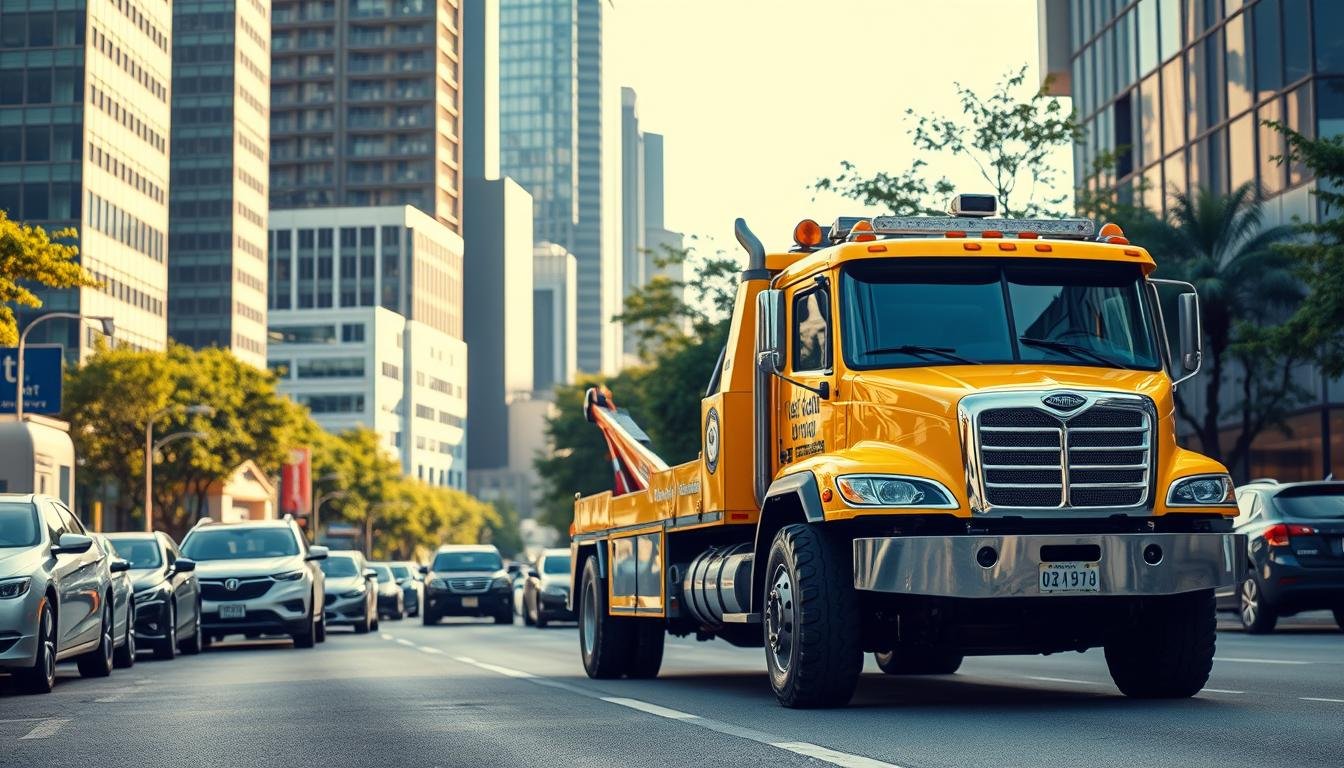Exploring RV transport costs in Canada can be tricky. Whether you’re moving a recreational vehicle across provinces or need specialized hauling, knowing the rates is key for those watching their budget.
The RV industry has seen big changes, mainly due to economic shifts and the pandemic. You might be thinking, “How can I get a good deal without overspending?”
Worry not! Our detailed guide will break down RV hauling expenses. We’ll explain pricing, regional differences, and ways to save on transport costs with a clear view of heavy-duty towing services.
Key Takeaways
- RV hauling rates vary significantly across Canadian provinces
- Distance and vehicle size are primary cost determinants
- Seasonal demand impacts transportation expenses
- Professional services offer reliability and safety
- Proper preparation can reduce overall hauling costs
Understanding RV Hauling Rates in Canada
The Canadian RV market has seen big changes in recent years. RV sales went up a lot in 2020 and 2021. Knowing about rv relocation services canada can help you understand this market better.
RV lovers in Canada face special challenges when moving their vehicles. The market changes a lot, affecting hauling rates and what services are available.
Market Overview
The Canadian RV market has grown a lot. This is because more people want to travel and see their country. This growth brings new chances and problems for rv relocation services canada.
- RV sales peaked in 2020-2021 during pandemic travel restrictions
- Market demand stabilized in 2022
- Regional variations in RV ownership across provinces
Factors Affecting Rates
Many things make rv towing fees in Canada complex. Knowing these can help you decide on RV transport. Factors such as distance, weight, and type of RV can significantly influence the overall cost. Additionally, it’s beneficial to consider the varying regulations across provinces, which can further complicate the pricing structure. For those looking to enter the industry, understanding these complexities can open up potential rv transport job opportunities in Canada.
| Factor | Impact on Hauling Rates |
|---|---|
| Distance | Directly proportional to transportation costs |
| RV Size | Larger vehicles require specialized equipment |
| Seasonal Demand | Rates fluctuate during peak travel seasons |
| Fuel Prices | Significant influence on overall hauling expenses |
Understanding these market changes can help you plan your budget. It’s important to research and compare to find the best rates.
Typical RV Hauling Rates Across Canada
Exploring RV shipping costs in Canada is like a journey across the country. Your costs can change a lot, like the wind in the prairies.
RV hauling companies in Canada have different prices. These prices reflect the challenges of moving RVs across our big land. Knowing these rates helps you plan your budget better. It’s important to compare various service providers to find the best deal that suits your needs. Keep in mind that rv hauling rates in canada can vary based on distance, vehicle size, and additional services required. By researching and gathering quotes, you can make an informed decision and avoid unexpected costs.
Regional Price Variations
RV shipping costs vary by region in Canada. Here’s a look at how prices differ:
- Western Canada (BC, Alberta): Higher rates due to mountain terrain
- Prairie Provinces (Saskatchewan, Manitoba): More affordable routes
- Eastern Canada (Ontario, Quebec): Moderate pricing with urban complexity
- Atlantic Provinces: Potentially higher costs due to remote locations
Average Cost Ranges
Here’s a summary of RV hauling costs:
| Distance | Small RV | Medium RV | Large RV |
|---|---|---|---|
| 0-500 km | $800-$1,200 | $1,200-$1,800 | $1,800-$2,500 |
| 500-1000 km | $1,200-$1,800 | $1,800-$2,500 | $2,500-$3,500 |
| 1000-2000 km | $1,800-$2,500 | $2,500-$3,500 | $3,500-$5,000 |
Keep in mind, these are just estimates. Your actual costs will depend on your RV’s details, fuel prices, and the time of year. Always ask for quotes from different RV hauling companies in Canada to find the best price.
Types of RV Hauling Services
When looking at RV transportation companies in Canada, it’s key to know the different hauling options. Whether you have a small travel trailer or a big motorhome, picking the right service is important. It affects your RV moving rates in Canada.
Your RV moving journey begins with two main choices: professional hauling and DIY moving. Each option has its own benefits and drawbacks. These can change your moving experience and how much it costs.
Professional Hauling Services
Professional RV transport companies in Canada offer full solutions for moving your RV. They provide:
- Specialized equipment for safe RV transport
- Drivers who know Canadian roads well
- Insurance for your RV while it’s being moved
- A stress-free moving experience
Different Types of Trailers
RV moving rates in Canada change based on the trailer type. The main trailer types are:
- Flatbed trailers – great for smaller RVs and travel trailers
- Enclosed trailers – good for keeping your RV safe from weather and road debris
- Specialized RV trailers – made for specific RV sizes and weights
Your trailer choice affects your moving costs and your RV’s safety during the move.
Factors Influencing Hauling Rates

Figuring out rv hauling rates canada can be tricky. Knowing what affects RV delivery rates canada helps you plan better and avoid unexpected costs.
When you’re planning to move your RV, several important things affect the cost. Let’s look at the main factors that influence hauling prices.
Weight and Size Matters
The size and weight of your RV greatly affect hauling costs. Bigger and heavier RVs need:
- More specialized equipment for transport
- More fuel to move them
- Special care when handling
Distance and Route Complexity
The distance and the route’s difficulty also play a big part in RV delivery rates canada. A simple route is cheaper than a tough one, like mountains or rural areas.
| Route Type | Estimated Cost Impact |
|---|---|
| Highway Transport | Base Rate |
| Mountain Routes | 15-25% Increase |
| Remote Rural Areas | 20-35% Increase |
Seasonal Demand Dynamics
RV hauling rates canada go up in summer, just like cottage rentals. Moving your RV in the shoulder seasons can save you money.
Understanding these factors helps you better plan and negotiate RV transport costs in Canada.
Additional Costs to Consider
When planning your RV hauling adventure, it’s key to know the full cost. RV hauling quotes in Canada often have more than just the base fee. Hidden costs can quickly add up and affect your budget.
Let’s look at the extra charges you might face during your RV transport journey:
Insurance Fees: Protecting Your Investment
Insurance is a big part of RV transport costs in Canada. Professional haulers offer different insurance packages to protect your RV. Your options might include:
- Basic liability protection
- Comprehensive transit insurance
- Replacement value coverage
Fuel Costs: The Fluctuating Expense
Fuel costs can greatly affect your RV hauling quotes in Canada. Several factors can change fuel costs, such as:
- Distance of transportation
- Current diesel and gasoline prices
- Vehicle weight and aerodynamics
Tolls and Additional Charges
Unexpected fees can catch off guard those who are not prepared. Here’s a look at possible extra charges:
| Charge Type | Potential Cost Range | Notes |
|---|---|---|
| Highway Tolls | $10 – $50 | Varies by province and route |
| Parking Fees | $20 – $100 | Depends on stops and duration |
| Oversize Vehicle Permits | $50 – $200 | Required for large RVs |
By expecting these extra costs, you can plan better and avoid surprises during your RV journey across Canada.
Choosing the Right Hauling Service
Finding the best rv hauling companies in Canada needs careful thought and research. Your RV is a big investment. So, picking the right transport service is key to its safe and reliable move.
When looking at rv transportation companies in Canada, focus on important criteria. This will help you make a smart choice.
Comparing Quotes Effectively
Don’t just go for the cheapest option. A good quote comparison looks at several things:
- Total transportation cost
- Insurance coverage details
- Estimated delivery timeframe
- Additional service charges
Reputation Research Strategies
Looking into a hauling company’s reputation is vital. It shows their reliability and service quality. Here are key steps:
- Check online customer reviews
- Verify professional certifications
- Request references from previous clients
- Investigate industry accreditations
| Evaluation Criteria | High Priority | Medium Priority |
|---|---|---|
| Price | Competitive rates | Transparent pricing |
| Experience | 5+ years in industry | Specialized RV handling |
| Safety Record | Zero major incidents | Consistent positive feedback |
Choosing the right RV hauling service is more than just about cost. It’s about protecting your valuable asset and ensuring a stress-free move.
Essential Questions to Ask Hauling Companies
Planning RV hauling in Canada? Knowing the right questions can prevent headaches and unexpected costs. Your preparation is key to a good service experience.
Understanding RV hauling rates in Canada needs careful questions. Before you sign, make sure you know what you’re getting. It’s essential to inquire about the factors that influence rv hauling rates in Canada, such as distance, the size of the RV, and any additional services included. Comparing quotes from multiple providers will help you gauge a fair price and ensure you receive quality service. Additionally, always read the fine print to avoid hidden fees that could impact your overall costs.
Insurance Inquiries for Peace of Mind
Protect your RV by asking about insurance:
- What specific coverage does your policy provide during transportation?
- Are there any exclusions I should know about?
- How does your insurance handle damage during loading or transit?
A good heavy-duty towing service will clearly answer these. This gives you confidence in their professionalism. Moreover, a reliable towing service will provide you with a range of towing service options available to suit your specific needs. Whether you have a large vehicle or require specialized equipment, knowing that they offer various solutions ensures that you are covered in any situation. Always choose a towing company that prioritizes customer satisfaction and safety.
Equipment Expertise Matters
The equipment used affects your RV’s safety. Ask about:
- What type of trailers and trucks do you use for RV hauling?
- Are your vehicles designed for RV transport?
- How often do you check and maintain your equipment?
By asking these questions, you’ll get a safe and smooth RV hauling experience in Canada.
How to Prepare Your RV for Hauling

Getting your RV ready for transport is key to a safe trip across Canada. It helps protect your vehicle and keeps it in good shape during the move.
Before your RV hits the road, make sure to check off a detailed prep list. This includes cleaning, maintenance, and securing loose items.
Essential Cleaning and Maintenance Steps
- Thoroughly wash the exterior and look for any damage
- Check the tire pressure and the RV’s structure
- Make sure all fluids are at the right levels
- Test the electrical systems and battery connections
Securing Interior Items
Securing items inside your RV is vital to avoid damage during transport. Here’s how to do it:
- Remove or tightly secure all loose objects
- Wrap fragile items with bubble wrap
- Close and lock all cabinets and drawers
- Disconnect and secure appliances
Professional heavy-duty towing services suggest a detailed check before moving your RV. This ensures your RV is safe.
| Preparation Area | Key Actions |
|---|---|
| Exterior | Clean, inspect, check tire pressure |
| Interior | Secure items, lock compartments |
| Mechanical | Check fluids, test electrical systems |
By following these steps, you’ll reduce risks and make sure your RV travels smoothly.
Understanding Insurance Coverage
Keeping your recreational vehicle safe during transport is key for RV owners in Canada. When looking at rv shipping charges canada, insurance is a big part of your plan. Knowing about insurance can help avoid stress and big money problems.
Basic insurance policies give basic protection, but they might not cover all situations with rv hauling quotes canada. It’s important to know what your policy does cover.
Standard Policy Coverages
Most standard RV insurance policies include:
- Basic damage protection during transit
- Liability coverage for road incidents
- Limited protection against external damages
Optional Coverage Considerations
While standard policies are good, you might also want extra coverage:
- Comprehensive transit insurance
- Total loss replacement coverage
- Personal belongings protection
- Emergency roadside assistance
The right insurance depends on your RV, how far you’re moving it, and how much risk you’re okay with. Hauling services can help find the best insurance for you.
Getting full insurance might seem like extra money, but it’s worth it. It gives you peace of mind and protects your wallet during transport.
Safety Regulations for RV Hauling
When you haul an RV in Canada, knowing the safety rules is key. These rules protect you, your RV, and others on the road. The cost of RV transport in Canada can change based on following these safety standards.
It’s important to know the rules for each province. RV hauling companies in Canada must follow these rules to ensure safe and legal transport. Each province may have specific regulations regarding weight limits, required permits, and safety standards that must be adhered to. By understanding these regulations, RV owners can choose reliable RV hauling services in Canada that prioritize compliance and safety. This knowledge not only protects the vehicle but also contributes to the overall safety of other road users.
Provincial Compliance Requirements
- Check specific weight restrictions for each province
- Verify trailer registration and documentation
- Understand provincial permit requirements
- Review specific towing regulations
Essential Equipment Standards
Having the right equipment is the first step in safety. RV haulers must meet strict standards to protect their vehicles and others on the road.
| Equipment Type | Required Standard | Safety Impact |
|---|---|---|
| Trailer Hitch | CSA Approved Rating | Prevents Disconnection |
| Brake Systems | Proportional Braking | Ensures Controlled Stopping |
| Safety Chains | Minimum Grade 30 Steel | Prevents Complete Trailer Separation |
By knowing these regulations, you can ensure a safe RV hauling experience in Canada. Always check with local transportation authorities for the latest rules.
The Future of RV Hauling Rates in Canada
RV transportation companies in Canada are on the verge of big changes. New trends are changing how we look at RV hauling rates in Canada. This is good news for travelers and the industry.
The Canadian RV market is seeing big changes. New tech and what people want are leading the way. Things like electric RVs and green transport are becoming more important.
Emerging Industry Trends
- Electric and hybrid RV transport solutions
- Advanced route optimization technologies
- Digital booking platforms
- Smart tracking and real-time monitoring systems
Environmental Considerations
Green efforts are changing RV hauling rates in Canada. Provinces are making rules to cut down on emissions. This means companies are looking into eco-friendly options.
Important green factors for RV hauling include:
- Carbon taxation policies
- Renewable energy investments
- Incentives for low-emission transportation
- Advanced fuel efficiency technologies
Your RV trips will soon be better for the planet and your wallet. Keep up with these trends to plan your next trip wisely!
Conclusion: Finding Fair RV Hauling Rates
Finding good RV hauling rates in Canada needs careful planning and smart choices. Start by doing your homework and looking for value, not just low prices. Consider reaching out to multiple service providers and requesting quotes to compare quality and reliability alongside cost. It’s also beneficial to read reviews and testimonials to ensure you’re selecting a trustworthy company. By prioritizing these factors, you can find competitive rv hauling rates in canada that meet your needs. Additionally, keep an eye out for seasonal discounts or promotions that could lower the overall cost of your RV transport. Understanding the various factors that impact RV hauling rates in Canada, such as distance and vehicle size, will help you make more informed decisions. Ultimately, being proactive in your research will lead to a smoother experience and potentially save you money in the long run.
When picking a hauling service, look beyond the cost. Check their reputation, insurance, and equipment quality. Learn about pricing factors to make a wise choice that safeguards your RV.
To get fair rates, compare quotes, ask questions, and know your RV’s needs. Things like location, RV type, and season affect prices.
Your hard work will be worth it. With the right knowledge, you’ll find a reliable, safe, and affordable service. Your RV will arrive safely, without breaking the bank.
FAQ
How much does it cost to haul an RV across Canada?
RV hauling costs in Canada vary a lot. This depends on the distance, RV size, route, and season. Costs can be between
FAQ
How much does it cost to haul an RV across Canada?
RV hauling costs in Canada vary a lot. This depends on the distance, RV size, route, and season. Costs can be between $1.50 to $3.50 per kilometer. Total costs can range from $1,500 to $5,000, based on the journey and RV details.
What factors affect RV hauling rates?
Several factors influence RV hauling rates. These include the RV’s weight and size, the distance, and the route. Seasonal demand, fuel prices, insurance, and the hauling service also play a role. Mountain routes or tough terrain can raise costs. Off-peak seasons might offer better rates.
Is it cheaper to haul an RV myself or use a professional service?
DIY hauling might seem cheaper at first. But, professional services often save you money and stress. They have the right equipment and experience to handle your RV safely and efficiently.
What additional costs should I budget for when hauling an RV?
When hauling an RV, remember to budget for extra costs. These include insurance fees, fuel surcharges, tolls, equipment rental, and special handling needs. It’s smart to add 10-15% to the quoted price for unexpected expenses.
How do I prepare my RV for transportation?
To prepare your RV, start by cleaning it thoroughly. Do maintenance checks, secure loose items, and disconnect batteries. Empty water tanks and document the RV’s condition before transport. Take photos and remove valuable or fragile items.
What insurance do I need for RV hauling?
Look for insurance that covers damage during transport. This includes collision, theft, and environmental risks. Make sure the hauling company’s insurance is adequate. Consider extra coverage for full protection of your RV.
Are RV hauling rates different across Canadian provinces?
Yes, RV hauling rates vary across provinces. This is due to terrain, distance, fuel costs, and local rules. Coastal provinces like British Columbia have different rates than prairie provinces like Alberta or Saskatchewan.
When is the best time to haul an RV in Canada?
The best times for RV hauling in Canada are late spring and early fall. Avoid summer and winter, as rates are higher due to demand or weather.
How far in advance should I book RV hauling services?
Book RV hauling services 4-6 weeks in advance, more during peak seasons. This allows time to compare quotes and secure the best rates. Summer months might require even earlier booking.
What questions should I ask a potentially RV hauling company?
Ask about their insurance, equipment, experience with your RV size, delivery times, and fees. Also, ask about damage protection policies and request references from previous customers.
.50 to .50 per kilometer. Total costs can range from
FAQ
How much does it cost to haul an RV across Canada?
RV hauling costs in Canada vary a lot. This depends on the distance, RV size, route, and season. Costs can be between $1.50 to $3.50 per kilometer. Total costs can range from $1,500 to $5,000, based on the journey and RV details.
What factors affect RV hauling rates?
Several factors influence RV hauling rates. These include the RV’s weight and size, the distance, and the route. Seasonal demand, fuel prices, insurance, and the hauling service also play a role. Mountain routes or tough terrain can raise costs. Off-peak seasons might offer better rates.
Is it cheaper to haul an RV myself or use a professional service?
DIY hauling might seem cheaper at first. But, professional services often save you money and stress. They have the right equipment and experience to handle your RV safely and efficiently.
What additional costs should I budget for when hauling an RV?
When hauling an RV, remember to budget for extra costs. These include insurance fees, fuel surcharges, tolls, equipment rental, and special handling needs. It’s smart to add 10-15% to the quoted price for unexpected expenses.
How do I prepare my RV for transportation?
To prepare your RV, start by cleaning it thoroughly. Do maintenance checks, secure loose items, and disconnect batteries. Empty water tanks and document the RV’s condition before transport. Take photos and remove valuable or fragile items.
What insurance do I need for RV hauling?
Look for insurance that covers damage during transport. This includes collision, theft, and environmental risks. Make sure the hauling company’s insurance is adequate. Consider extra coverage for full protection of your RV.
Are RV hauling rates different across Canadian provinces?
Yes, RV hauling rates vary across provinces. This is due to terrain, distance, fuel costs, and local rules. Coastal provinces like British Columbia have different rates than prairie provinces like Alberta or Saskatchewan.
When is the best time to haul an RV in Canada?
The best times for RV hauling in Canada are late spring and early fall. Avoid summer and winter, as rates are higher due to demand or weather.
How far in advance should I book RV hauling services?
Book RV hauling services 4-6 weeks in advance, more during peak seasons. This allows time to compare quotes and secure the best rates. Summer months might require even earlier booking.
What questions should I ask a potentially RV hauling company?
Ask about their insurance, equipment, experience with your RV size, delivery times, and fees. Also, ask about damage protection policies and request references from previous customers.
,500 to ,000, based on the journey and RV details.
What factors affect RV hauling rates?
Several factors influence RV hauling rates. These include the RV’s weight and size, the distance, and the route. Seasonal demand, fuel prices, insurance, and the hauling service also play a role. Mountain routes or tough terrain can raise costs. Off-peak seasons might offer better rates.
Is it cheaper to haul an RV myself or use a professional service?
DIY hauling might seem cheaper at first. But, professional services often save you money and stress. They have the right equipment and experience to handle your RV safely and efficiently.
What additional costs should I budget for when hauling an RV?
When hauling an RV, remember to budget for extra costs. These include insurance fees, fuel surcharges, tolls, equipment rental, and special handling needs. It’s smart to add 10-15% to the quoted price for unexpected expenses.
How do I prepare my RV for transportation?
To prepare your RV, start by cleaning it thoroughly. Do maintenance checks, secure loose items, and disconnect batteries. Empty water tanks and document the RV’s condition before transport. Take photos and remove valuable or fragile items.
What insurance do I need for RV hauling?
Look for insurance that covers damage during transport. This includes collision, theft, and environmental risks. Make sure the hauling company’s insurance is adequate. Consider extra coverage for full protection of your RV.
Are RV hauling rates different across Canadian provinces?
Yes, RV hauling rates vary across provinces. This is due to terrain, distance, fuel costs, and local rules. Coastal provinces like British Columbia have different rates than prairie provinces like Alberta or Saskatchewan.
When is the best time to haul an RV in Canada?
The best times for RV hauling in Canada are late spring and early fall. Avoid summer and winter, as rates are higher due to demand or weather.
How far in advance should I book RV hauling services?
Book RV hauling services 4-6 weeks in advance, more during peak seasons. This allows time to compare quotes and secure the best rates. Summer months might require even earlier booking.
What questions should I ask a potentially RV hauling company?
Ask about their insurance, equipment, experience with your RV size, delivery times, and fees. Also, ask about damage protection policies and request references from previous customers.




